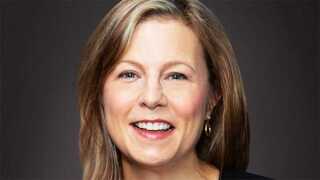What are some of the biggest challenges you faced as a women in the telco/tech industry but more importantly how did you overcome them?
I would say that I get that question a lot and I don’t know that I’ve necessarily found as many challenges as people think. I’m actually one of the few women who actually is a financial analyst, for many years I was the only woman in this space and now I have another peer, Amy Young at Macquarie. I would say it has given me an opportunity to have a unique voice.
In telecoms, I think that men and women typically have a different way of asking questions, a different style and I believe this has given me a refreshing view. It’s not unusual for me to host a dinner, or some other event, solely will all men. I don’t even think about it anymore because it happens so often. But I wouldn’t say that it has put me at an disadvantage, if anything I think it’s a unique voice that people like to hear.
What did you learn from those experiences and how did it shape your career moving forward?
I would say it has been an asset to me often some of the companies would joke that I was their favourite female analyst, because I was the only one. It has given me access, because many times these organisations are very focussed on diversity initiatives themselves, so travelling with me or hosting a dinner with me, or having me ask a question on a conference call, there seems to be something that they’re all very aware of and mindful of.
As you are now in senior position yourself, how do you help the next cohort of young women as they progress in their careers?
I’m a big believer in mentors but I think it’s a very easy thing to say. People want to find a mentor but only a real mentor is going to allow you to learn from your own mistakes and not just listen to themselves talk – that’s a key part of it. Many people reach out to me from my college that I try to work with or young men and women I’ve worked with along the way. One of the stats I am most proud of in my career is that many of my associates have gone on to do other things and been incredibly successful in those areas, more successful than I have been in some cases. So that is kind of a badge of honour for me in many ways!
What do you think needs to happen in your industry to bridge the gender gap or do you think enough is already being done?
I think there is a lot more that can be done. I think one of the things that hasn’t been showcased is how good Wells Fargo is with things like flexible working. These days you really need a phone, very good broadband speed, a computer and probably very good location to a good airport, and then if you’re very self-motivated you can do your job very successfully.
When I had twins in 2007, one of them had some challenges and to be honest I didn’t think I would be coming back to work. But my boss at the time allowed me all the tools to be able to work, not just flexibly but in a way that was best for my family. I think companies overall really do have to understand that, more so for women, only because when mothers have children a lot more challenges arise. Not that it’s not difficult for fathers, it’s just a different set of challenges. Companies really need to be aware of that and be flexible for that because then I think that retention will come.
What single piece of advice would you give a young woman, who wants to do what you have done and reach the top of their career?
The best advice I can give people is be an ear, not a mouth. Meaning listen as much as you can, take as much as you can in, to learn as much as you can at different times. When I came out of business school, my job was as a sales assistant doing things like ordering limos and making restaurant recommendations. I’d be lying if I didn’t say half the time I was like ‘why did I even get an MBA for this’ but the value of it was listening to other people making the sales calls, doing the research calls, because I was in ‘sponge mode’ listening to what was going on around me and that was invaluable. It’s about who really wants to listen, some want a mentor just to say they have one, but they don’t really want to learn from that mentor.
What inspired you to become a Women in and Telco Tech advocate? What was it about this particular initiative that resonated with you?
Well first off, I’m big fan of Capacity events! The intimate nature of your conferences allows you to get to know people at a different level, which really complements what you are doing.
Through that, I’ve met some really dynamic women. These contacts have been great professional relationships as we can swap stories and experiences. While there are few women in telecom – I believe it is even more apparent on the tech side of the business. I think any kind of community where you can get strong, ambitious, professional women together I think would is incredibly empowering.
Its true of anything, communities build bridges, build communication and having a group I think is hugely important. I recently met a woman who was in private equity and she was telling me that they events and conferences for women in private equity and the room is always half full. Her point to me is that it’s very lonely, she doesn’t know many other women in that sector, and loneliness is an epidemic. So any kind of fostering bridges In that, is nothing but a positive thing.





![8df0aa35-71f4-4fa1-a347-4ba47730b04a[1] (1).JPG.jpg](https://assets.euromoneydigital.com/dims4/default/a779818/2147483647/strip/true/crop/994x559+0+0/resize/320x180!/quality/90/?url=http%3A%2F%2Feuromoney-brightspot.s3.amazonaws.com%2F39%2F6c%2F3f4cbeb04dabb175f77c31d0939a%2F8df0aa35-71f4-4fa1-a347-4ba47730b04a1-1-jpg.jpg)
